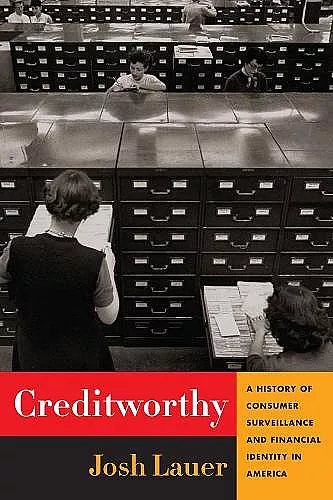Creditworthy
A History of Consumer Surveillance and Financial Identity in America
Format:Hardback
Publisher:Columbia University Press
Published:1st Sep '17
Currently unavailable, and unfortunately no date known when it will be back

The first consumer credit bureaus appeared in the 1870s and quickly amassed huge archives of deeply personal information. Today, the three leading credit bureaus are among the most powerful institutions in modern life-yet we know almost nothing about them. Experian, Equifax, and TransUnion are multi-billion-dollar corporations that track our movements, spending behavior, and financial status. This data is used to predict our riskiness as borrowers and to judge our trustworthiness and value in a broad array of contexts, from insurance and marketing to employment and housing. In Creditworthy, the first comprehensive history of this crucial American institution, Josh Lauer explores the evolution of credit reporting from its nineteenth-century origins to the rise of the modern consumer data industry. By revealing the sophistication of early credit reporting networks, Creditworthy highlights the leading role that commercial surveillance has played-ahead of state surveillance systems-in monitoring the economic lives of Americans. Lauer charts how credit reporting grew from an industry that relied on personal knowledge of consumers to one that employs sophisticated algorithms to determine a person's trustworthiness. Ultimately, Lauer argues that by converting individual reputations into brief written reports-and, later, credit ratings and credit scores-credit bureaus did something more profound: they invented the modern concept of financial identity. Creditworthy reminds us that creditworthiness is never just about economic "facts." It is fundamentally concerned with-and determines-our social standing as an honest, reliable, profit-generating person.
Who deserves credit? Who is a prime borrower, and who is subprime? The stakes of these questions could not be higher: loans are essential to the education, transport, and housing of millions. Lauer has written a compelling history of how businesses assess creditworthiness, from nineteenth-century trade associations to contemporary data science mavens. Lucid and packed with fascinating detail, Creditworthy is an essential guide to the intersection of finance and surveillance. -- Frank Pasquale, University of Maryland Clearly written, well researched, and wide ranging, Creditworthy provides a fresh account of the evolution of credit agencies in the United States. By combining insights from business history and cultural studies, Lauer probes the sometimes unsettling role of corporate surveillance in the making of financial identity. -- Richard R. John, Columbia University At last! A book that drills down into the history of consumer credit-scoring and demonstrates its massive contribution to our daily experience of contemporary surveillance. Not just a vital chronicle of a hitherto hidden history but a principled account of what happens when human value is reduced to monetizing consumer details. Creditworthy penetrates to the core of contemporary capitalism's disturbing obsession with personal data. -- David Lyon, Queen's University, Canada Consumer credit reporting is ubiquitous, but its pioneering role in the surveillance of consumers has been poorly understood-until now. Josh Lauer has dug deep into the historical sources and marshaled his findings into a rich and cohesive narrative that encompasses business dynamics, social norms, technology, and regulation. This book will become the indispensable source on the history of both consumer credit reporting and the surveillance society. -- Rowena Olegario, University of Oxford Josh Lauer has written an important book for anyone interested in the history of consumer credit. Long before there were FICO scores, consumers' creditworthiness was being assessed and considered. Without the developments Lauer documents in this notable work, it is unlikely consumer credit would have exploded as it did in the early twentieth century. A must read! -- Martha Olney, University of California, Berkeley [A] fascinating study of the credit-rating industry's central role in creating the 'modern surveillance society.' ... Lauer's top-down economic history is a thorough, enlightening, and long-overdue contribution to the field. Publishers Weekly
- Winner of SSN Book Award, Surveillance Studies Network 2018
ISBN: 9780231168083
Dimensions: unknown
Weight: unknown
368 pages